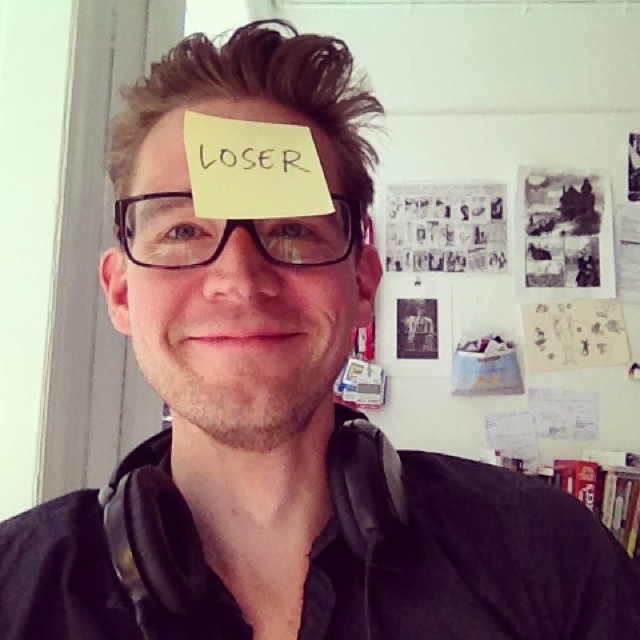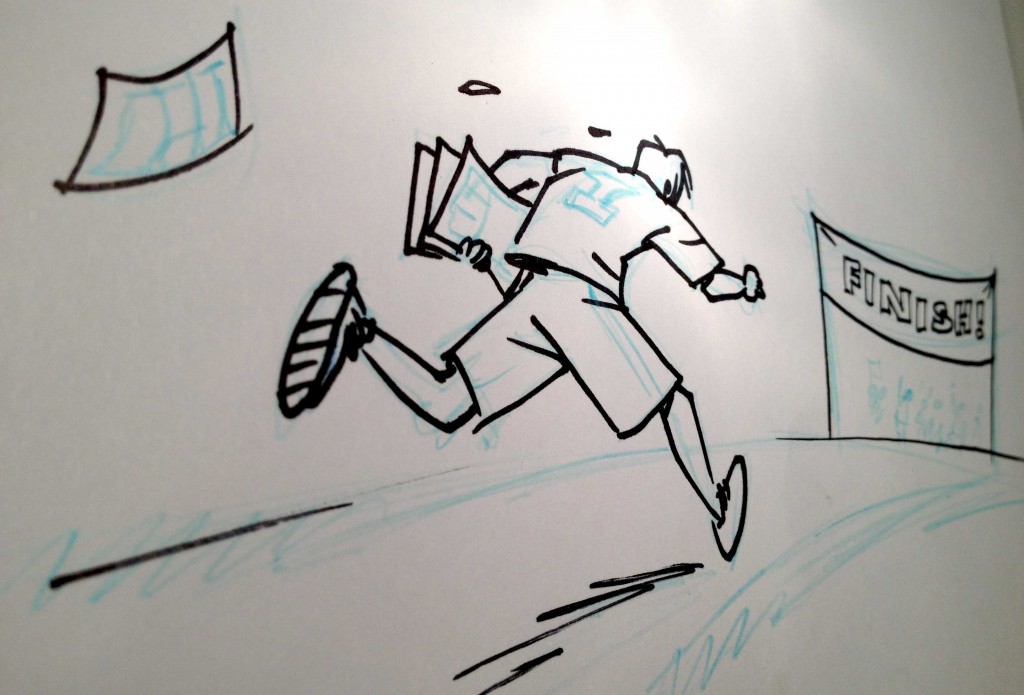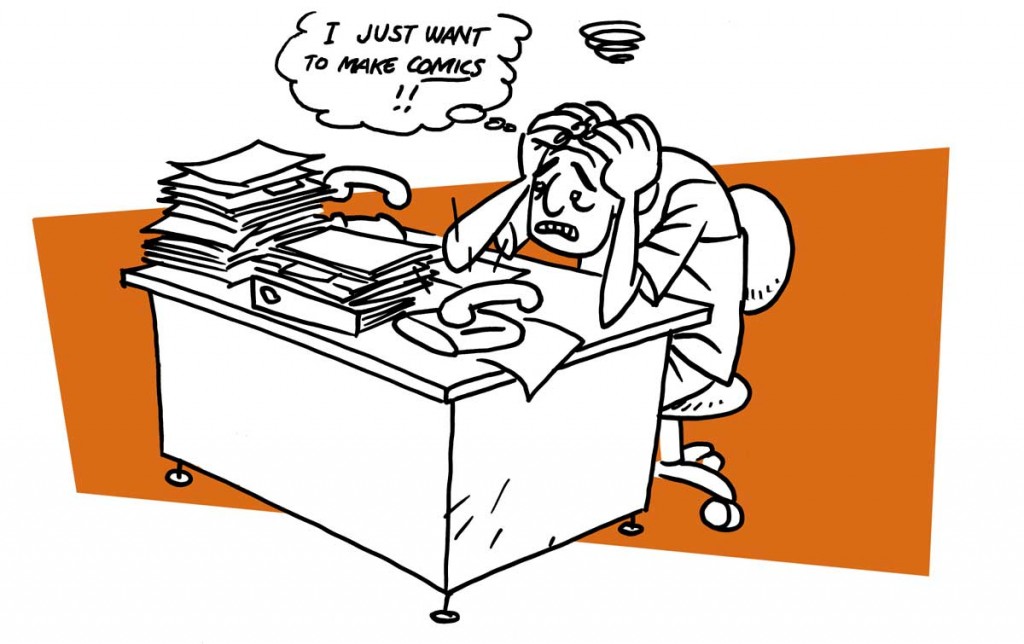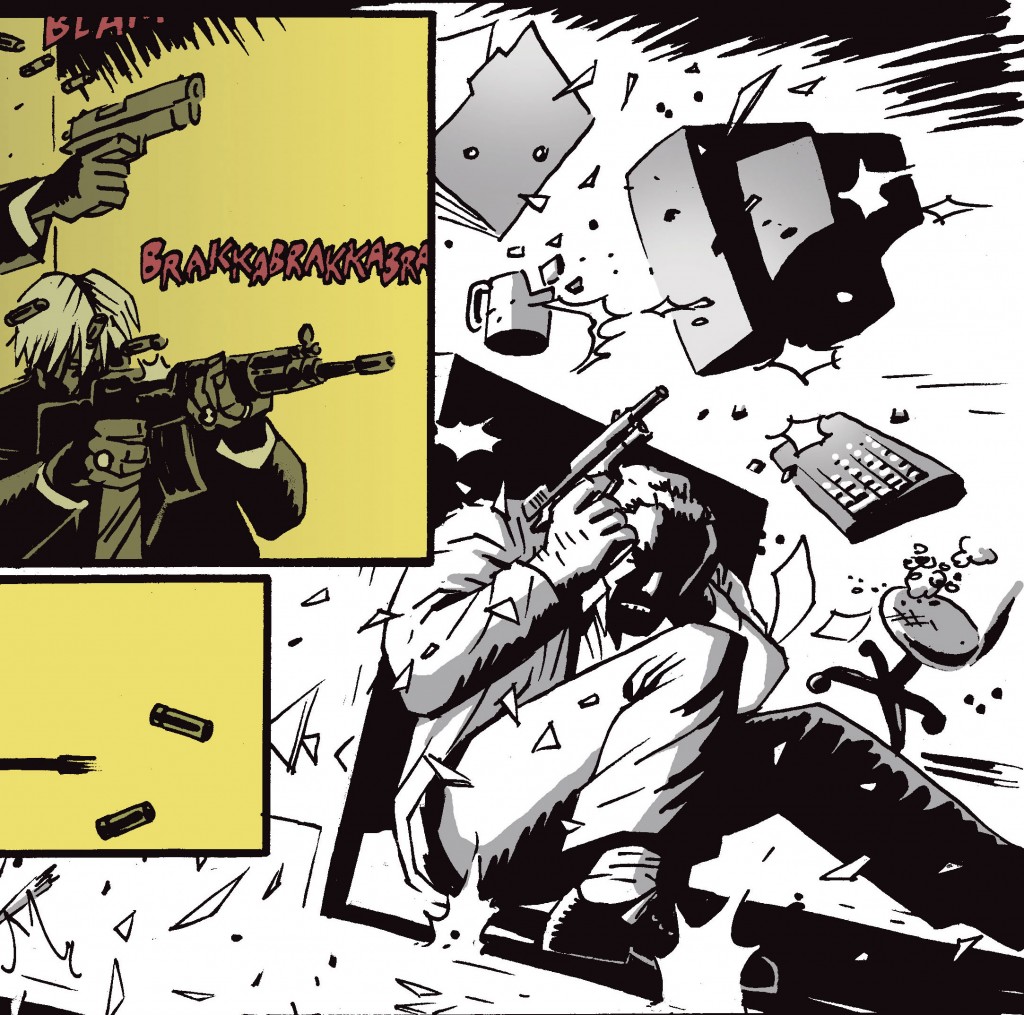I’ve just finished my work on the monthly book from BOOM!, Thomas Alsop. This video is about some of the lessons I learned working on that book – hopefully there is some value in it for you too!
mind hacks
Get To The Finish Line
The most important thing about making comics, is finishing what you start. No one will get anything out of a half-finished story, least of all you!
Be aware that when you are working on a project, it can be very tempting to bail when problems arise. You get stuck on some aspect of the story or things that are hard to draw. That other story you have brewing somewhere in the back of your mind suddenly seems way more attractive. You feel like that’s the one you should really be working on.
But with every new story, comes new problems! You just don’t see them now, because you are not deep in the story yet. It is simply the dream of what it could be, so much better than what you are currently working on.
And of course you can work on any story you feel like. I would just advice that you finish them eventually. One by one.
Another thing that happens as you’re working, is that you learn. You grow. You look at the work you’ve already done, and you think you could do better. If you go back and change that particular scene or redraw that particular panel.
My advice? DON’T!
You’ll end up re-drawing the same three pages over and over again.
Finish the story. Then go back. If it still needs some work. 9 times out of ten, what seemed hopeless and bad during the process, will seem irrelevant and pretty OK after you have finished the story.
The most important thing to gain by finishing a project, is the confidence you build. Making comics is a lenghty and often gruelling process. It’s easy to feel like it’s all for nothing. You start beating yourself up. You feel you are not good enough, that nobody cares.
Having something finished changes that. Now you can show it to others, get feedback, respect. You have achieved! You are a success!
Abandoning a project half way through has the opposite effect; You feel like a failure. Do you think feeling like a failure helps your productivity?
The short answer is NO.
You learn more from one finished comic, even a three page one, than from ten projects that are halfway done.
Get to the finish line. Even if you have to stagger or crawl to get there.
Bonus Vid – Sketching a page of Thomas Alsop
Another look into the my process as I sketch a page of Thomas Alsop (out now from BOOM! Studios).
For more on Thomas Alsop go to http://thomasalsop.com/.
Finding time to do comics
A lot of us struggle finding the time to make comics. There just aren’t enough hours in the day!
Though some of us are richer or more talented than others, there is one area were we are all equal: we all have the same 24 hours in day. Here are a few tips on how to make your comics hours count.
Get up earlier.
An hour a day can really make a world of difference. Small steps towards your goal is better than none.
Plan ahead.
Before you go to sleep at night, decide what piece of the big picture (page, panel, scene, character) you will be working on the next day – Or whenever you get a time slot. Oftentimes small breaks pop up during the day, which we end up wasting on Twitter or goofing around. Have something ready that you can just pick up and work on whenever the opportunity arises.
Focus on one little step at a time.
When we think of our comics as a whole, it’s easy to get overwhelmed by the amount of work that lies ahead; outlining, scripting, thumbnails, rough sketches, research, more sketches, character design, pencils, inks, color, lettering, promotion… Arrgh!
Stop, take a deep breath and focus. One thing at a time.
Just say no.
If we all have the same amount of hours in the day, how come some people get more done than others? My guess: They either have enough money that they don’t have to spend all their time shovelling coal. Or: they prioritize. If you really want to make comics, you will probably have to sacrifice some things to clear your schedule. If you can’t cut down on working hours, maybe cut down on the hours you spend playing videogames or watching tv.
What are your tips for making more of the time you have available? Please share!
Related podcast: Getting Stuff Done
The price of praise
 I was up for an award here in Denmark this weekend, the Ping, something like the Danish equivalent of the Eisners. I was nominated for my graphic novel, STILETTO, in the main category. I didn’t win, which puts me in a position to talk about the nature of validation and the need for praise, instead of just tooting my horn and talking about how awesome I am.
I was up for an award here in Denmark this weekend, the Ping, something like the Danish equivalent of the Eisners. I was nominated for my graphic novel, STILETTO, in the main category. I didn’t win, which puts me in a position to talk about the nature of validation and the need for praise, instead of just tooting my horn and talking about how awesome I am.
Of course I would have loved to win that award, I was hoping for it and at the same time trying NOT to hope for it, because dissapointment is not the greatest feeling in the world. But here’s the thing: If I HAD won that award, it would have felt great for a few moments, maybe a few days. But the need for praise and validation never really goes away.
It’s never enough.
The needy little part of an artist’s soul is always going to want more. I don’t know anyone who feels they have enough fan mail or awards on their shelf that it fulfils their need. I don’t belive those people exist. You can never drink enough water that it keeps you from ever being thirsty again.
So while I would loved to have won, it’s more because it would have helped me with press and such going forward. It’s like those booster points you get in computer games, where you pick up the coin or whatever and you get a rocket attached to your back. An award or a great review gives you that boost for a few seconds, and then the effect wears off. The game continues. You start looking for the next gold coin.
What I’m trying to say is, if you ever find yourself up for an award or a job or anything, think of it as a step towards an end goal. Always keep that in mind. And stay busy! Keeping busy and working on your craft is not only great for building a career, it’s also your best defense against the needy, selfish little part of you that worries wether anyone really, I mean REALLY, loves you or they’re all just pretending. The part of you that looks on other people with envy and want to keep you from building confidence and self-sustainability. I don’t know what the purpose of that part of our brain is, but I’m willing to bet good money we all have it.
I try to teach my kids to be grateful of the things they have rather than bitch about what they don’t have. It’s hard for a kid to see another kid with an ice cream. But that’s LIFE. And it goes on like that.
So I’m here at the studio hunched over my desk as the sun is baking outside, grateful for working on the Thomas Alsop comic more or less full time, grateful for the praise I DO get and the support of all the subscribers on Comics for Beginners, thankful for every “like” on Facebook, but not depending on it for my sense of self-appreciation. Grateful for having done work I’m proud of and having it published, and having a supportive wife who takes care of our kids while I’m at work on a national holiday and who never asked me to get a real job instead of wasting my time doing comics. I am so very, very lucky and very happy right now, doing what I love and am relatively good at.
Thank you.
Now back to work.
—
Related post: Why you can’t learn from success
Seeing the images before drawing them
I got a really good question in an email the other day. A subscriber in Nigeria (Hello, Africa!) asked me about conceptualizing: “How do you see each drawing before you actually put pen to paper?”
My gut response was: Well, it just pops into my head.
I realize that’s not very helpful – although it’s very close to the truth! The whole truth is of course more nuanced.
The reason why these images just pop into my head on a very intuitive level is because I’ve put them there. Not on purpose, not by design. But by watching a whole lotta stuff over the years. Comics, painting, movies, real life – all of the things I’ve seen with my eyes, my brain remembers. All right, maybe not ALL the things I’ve seen. But you get the idea. The more you look at images, the more likely you are able to remember and replicate an image.
But again that’s not the whole truth.
Drawing these images vastly improves your ability to remember and replicate them. The more life drawing, the more copying you do, the more images you solidify in your subconsciousness.
The images that pop into my head probably do so, because I’ve seen them or drawn them before. Not that exact image, but something similar.
A few exercises:
- Watch movies. Pause the dvd, draw the image on the screen. As fast as you can. Study the composition, the lighting. Save your sketch for later. Steal from yourself.
- Read comics. No, in fact just pick a few comic books off the shelf and flip through them before you start your work. Put some images in your head (but don’t copy them!)
- Sketch. A lot. Try out several versions of the same image, different angles. Do thumbnail versions of your pages and be conscious about varying the sizes of the panels, shift between close ups, tilted shots, silhouettes – whatever you can do to shake things up.
The image the Nigerian subscriber mentioned as a reference was this one.:
I can see why it looks seducingly easy, like I’m some comics genius. But I probably made half dozen versions of this image before landing on this one. At least in my head. That’s where the images usually come from, as I’m writing the script.
It’s not easy. But it get’s easier. The more images I see, the more images I draw, the more I have to replicate from.
And you know that feeling of having an image inside your head and not being able to get it down on paper? Yeah, I get that too. But I’ve learned to ignore it. The image in my head washes away and is replaced with whatever is on the page, and that’s OK. It’s just one drawing out of hundreds, thousands. I get less attached the more I draw. I feel like that’s the secret to making comics in some weird way. Not caring so much for the individual image but caring about the flow of the story.
Hope the longer answer is more helpful!
Related podcast: Drawing Every Day


